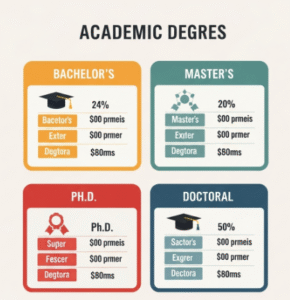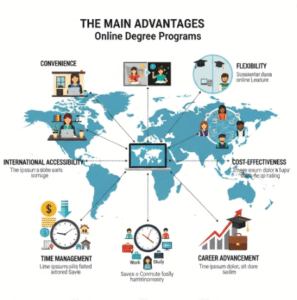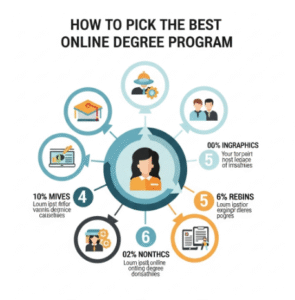Through digital platforms, an online degree provides students with flexible and accessible education, enabling them to obtain approved credentials from any location. Perfect for distant learners or working professionals, it offers ease without sacrificing quality, assisting people in changing occupations or advancing their careers.
An online degree: what is it?

An academic credential obtained mostly or exclusively online is called an online degree. Online programs, in contrast to traditional on-campus degrees, include digital assignments, virtual classrooms, and live or recorded lectures.
The same academic rigor and legitimacy as their offline equivalents are guaranteed by the authorized schools, universities, and professional institutes that offer these degrees. The majority of academic disciplines now provide a digital pathway for associate’s, bachelor’s, master’s, and doctorate degrees.
Degree Types Offered Online

1. Bachelor’s degrees
Associate degrees, which typically last two years, are perfect for those who want to enter the workforce quickly. They are available in fields including criminal justice, IT, healthcare, and business.
2. Bachelor’s degrees
Online bachelor’s programs, which last around four years, provide a variety of fields, such as psychology, business, teaching, engineering, and more.
3. Master’s degrees
Online master’s degrees provide workers pursuing higher education the opportunity to specialize in fields such as communication, data science, or management administration.
4. Ph.D. and Doctoral Programs
Numerous colleges provide PhD programs in subjects including public administration, leadership, healthcare, and education that are entirely or partially online.
Principal Advantages of Online Degree Programs

- Convenience and Flexibility
The flexibility to learn on your own time and at your own speed is one of the main benefits. For students juggling school, employment, or family obligations, this is quite beneficial. - International Accessibility
Without ever leaving your house, you can enroll in a degree program provided by a university in another nation. This makes high-quality education more accessible and eliminates regional restrictions. - Cost-effective Learning
In terms of tuition and related expenses like lodging, transportation, and supplies, online programs are frequently less expensive than traditional ones. - Time management and self-control
Strong time-management and organizing abilities are frequently developed by online learners, and they are advantageous in the job. - Progress in Careers
To progress in their jobs, move into other industries, or qualify for promotions, many professionals seek online degrees.
How to Pick the Best Program for an Online Degree

♦ Certification
Make sure the online course has been approved by a reputable certifying organization at all times. This guarantees that companies will value your degree and that it will be eligible for certifications or additional education.
♦ Specialties and Curriculum
Verify if the program’s curriculum complements your professional objectives. Additionally, some programs provide electives or specialties that might help you stand out in the employment market.
♦ The Learning Mode
Recognize if the course is asynchronous (using pre-recorded content) or synchronous (using live sessions). Select a mode based on your availability and preferred method of learning.
♦ Assistance for Students
Seek out programs that provide access to digital libraries, career counseling, academic counselors, and tech help.
♦ The technological prerequisites
Make that the technical specifications for video conferencing, course platforms, and other digital tools are met by your device and internet connection.
Popular Subjects in Business Administration and Online Education
- IT & Computer Science
- Nursing and Health Sciences
- Teaching and Education
- The study of psychology
- Justice for Criminals
- Engineering
- Communications and Marketing
There are several online degree choices available in each of these subjects, suitable for both novice and expert students.
Myths & False Beliefs Regarding Online Degrees

- “Online degrees are not valued.”
This isn’t true anymore. Employers now accept recognized online degrees on par with traditional ones, and many prestigious colleges also offer online programs. - “Online learning won’t teach you as much.”
To promote dynamic and efficient learning, online education makes use of contemporary learning resources including discussion boards, quizzes, live projects, and simulations. - “You Must Be an Expert in Technology”
Even for novices, most platforms are straightforward to use and manage, however a basic understanding of computers is helpful.
Online Program Fees and Financial Assistance
Tuition can still range from $5,000 to $25,000+, depending on the program and school, even though online degrees are often less expensive. Thankfully, a lot of universities provide online learners with employment reimbursement plans, financial help, grants, and scholarships. If you live in the United States, you should always complete the FAFSA (Free Application for Federal Student assistance) or look into local assistance programs in your nation.
Advice on Getting the Most Out of an Online Degree Program
- Establish a Study Schedule: Think of your program like a job and schedule lectures, homework, and revisions accordingly.
- Remain organized by managing deadlines and course materials with programs like Trello, Notion, or Google Calendar.
- Actively Participate: Take part in forums and debates to further your education and create relationships.
- Ask for Help: When you’re having trouble, don’t be afraid to ask teachers or support staff for assistance.
- Keep yourself motivated by setting goals and rewarding yourself when you reach them.
In conclusion
From the convenience of your own home, online degrees offer a pathway to lifelong study, professional advancement, and personal improvement. Advanced technology, flexible learning styles, and growing employer acceptance have made online education a potent substitute for traditional classroom instruction.
Prior to enrollment, make sure you understand your goals, investigate and contrast your possibilities, and confirm accreditations. Your future might be improved and new chances opened up with the correct online degree.
